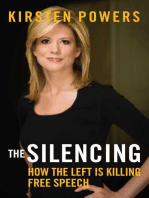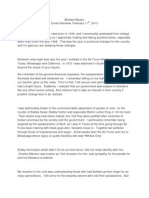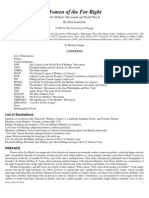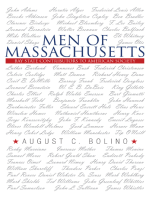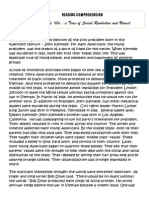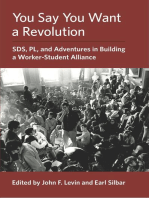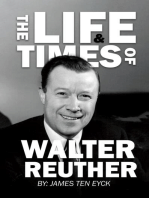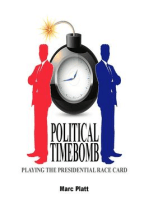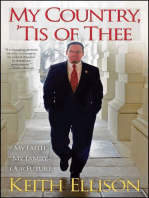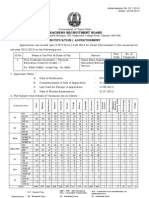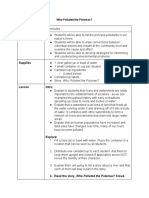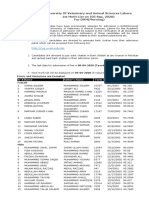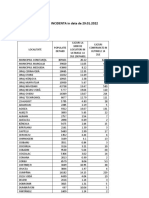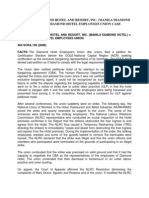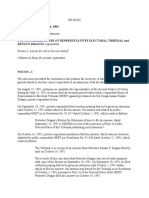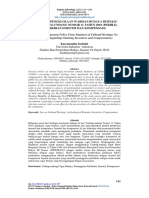Professional Documents
Culture Documents
Maureen o
Maureen o
Uploaded by
api-202501094Original Description:
Original Title
Copyright
Available Formats
Share this document
Did you find this document useful?
Is this content inappropriate?
Report this DocumentCopyright:
Available Formats
Maureen o
Maureen o
Uploaded by
api-202501094Copyright:
Available Formats
Maureen OConnor VISTA Volunteer 1967 Email Interview, January 25th, 2013 Where are you from?
I was born in Hamilton, ONT, Canada, grew up in Detroit, MI.; moved to Boston 1970. What was your personal experience like in the late sixties? Did 1968 particularly stand out from the other years of the turbulent time period? I graduated from Marygrove, an all-female liberal arts Catholic college, in 1966. I was affected by the second Vatican ecumenical council in Rome and the outreach of the Catholic Church to other religions. (Im no longer a member of the Catholic Church). After teaching in upstate NY, I returned to Detroit the summer of 1967, taught Head Start in a poor black neighborhood, witnessed some of the effects on TV and in nearby neighborhoods of Detroit riot of 1967. The city was under 8 p.m. curfew; sister Sharon, who was working a summer job at Sears, heard about sniper on roof of store, called home asking my father to pick her up from work. He did. During the evening curfew, the family played Jeopardy in the rec. room of our basement. Yes, 1968 stood out as the year of the TET offensive in Vietnam (Jan.) and the assassinations of MLK (April) and Bobby Kennedy (June). I worked for Eugene McCarthys campaign, the peace candidate of the Democratic Party. I applied to VISTA in April 1968, after the death of MLK. From September 1968-69, I worked as a VISTA volunteer (doing community organizing and tutoring) in poor black neighborhood in North Carolina. The KKK was still active in Rowan County. In November 1968, Richard Nixon won the election. I mailed my absentee ballot to Michigan from NC. I believe I voted for Eldridge Cleaver of the Peace and Freedom Party instead of Hubert Humphrey. In retrospect, this was a mistake. Racist Governor George Wallace of Alabama also ran as a candidate for the American Independent party. He won most of the Southern states. What do you think was the reason so many people were riled up when the US was in a period of relative stability and confidence? The US was relatively economically stable then. Many were still experiencing the benefits of the post WW II economic boom. Housing prices and rents, college tuition all were low compared to today. My mother was a housewife who didnt work, but we managed on my fathers salary. All of my sisters worked part time jobs through high school and college. However, there was still a large minority of poor people (See VISTA memoir for total count). Most Americans didnt know about these poorblack, white, Native
American, etc. until Michael Harringtons book The Other America was published in 1962. President JFK read it and it became a best seller. Also, many peopleyoung and old--became upset by what they saw on TV newscasts: Violence vs. voter registration of blacks in South as well as the atrocities committed by some US soldiers during the Vietnam War. By 1968, many students and others recognized that Sec. of Defense McNamara and General Westmoreland had been lying to the American people about how successful the war was being waged. This has been documented in the Pentagon Papers released in the early 1970s. What do you think went wrong with the student protests? (oral answer) Do you support one (or more) of the proposed theories? I dont support any of the 3 theories but can relate to comment #1. 1) permissive upbringing and relative affluence spoiled the generation . . . Folks accused Dr. Spocks baby book of creating a generation of permissive kids. I was raised pretty strictly by parents. Nevertheless, I was out of college when I became engaged in war on poverty and peace movementhad to do with timing of events. See the memoirs of Cathy Wilkerson (Flying Close to the Sun), Bill Ayers and Mark Rudd (Underground) for examples of SDS students who later became part of the violent Weatherman faction. All 3 were raised in affluent families. There were exceptions like Tom Hayden, the cofounder of SDS at the University of Michigan, and Abby Hoffman, co-founder of the Yippies, both of whom were from working-class families I dont think we can say that anyone is greedy by nature. Isnt greed a learned behavior? Maybe arrogant? 2) Liberal arts colleges . . . . Not my experience from liberal arts college I attended. I had no excess leisure time. It may have been true of others colleges, but I still think this is a generalization. 3) Definitely disagreealso too general of a statement. It sounds like there was group of people conspiring. You need to provide proof of this. Does the liberal elite only include those in government or does it include business and academic leaders? We cant lump all post-WWII folks (Baby boomers) into one. Most people I knew who were involved in war on poverty, civil rights, and anti-war movement were NOT using the ideals of pacifism and racial equality to cover up their true, power hungry intentions. We genuinely believed in our causes. Many of us went into social work, teaching, and other social service work like poverty law. The hippies who smoked marijuana and experimented with LSD would not even have considered establishing themselves as the liberal elite. They often didnt vote and dropped out of society, living in communes. The post WWII generation also included members of the Young Republicans, members of Young Americans for Freedom (YAF), although they were in the student minority
then. Then there were students in the middle who were neither identified with left or right. Probably also in the minority in the sixties. Having written this, some political leaders I can think of who are liberal and involved in civil rights and/or anti-war activities in the sixties are: Congressman John Lewis (SC) was a Freedom rider and friend of MLK. Senator John D. Rockefeller (West VA) was an early VISTA volunteer Bill Clinton organized anti-war protest in Britain and received a draft deferment. Senator John Kerry (MA) was leader of Vietnam Veterans vs. the War (VVAW) Sam Brown, a former Vietnam peace activist, became head of ACTION (VISTA, Peace Corps) in President Jimmy Carters administration.
You might also like
- What Was Liberalism The Past - Present - and Promise of A Noble Idea by James TraubDocument294 pagesWhat Was Liberalism The Past - Present - and Promise of A Noble Idea by James Traubedsopine1100% (1)
- Power to the People: The World of the Black PanthersFrom EverandPower to the People: The World of the Black PanthersRating: 4 out of 5 stars4/5 (12)
- The Silencing: How the Left is Killing Free SpeechFrom EverandThe Silencing: How the Left is Killing Free SpeechRating: 3 out of 5 stars3/5 (4)
- Sample QCD With Life EstateDocument2 pagesSample QCD With Life Estatemarioma12Noch keine Bewertungen
- Terror in the Heart of Freedom: Citizenship, Sexual Violence, and the Meaning of Race in the Postemancipation SouthFrom EverandTerror in the Heart of Freedom: Citizenship, Sexual Violence, and the Meaning of Race in the Postemancipation SouthRating: 4 out of 5 stars4/5 (2)
- Intellectuals in ActionDocument316 pagesIntellectuals in ActionGiedre Saba100% (1)
- Values Matter Most: How Republicans, or Democrats, or a Third Party Can Win and Renew the American Way of LifeFrom EverandValues Matter Most: How Republicans, or Democrats, or a Third Party Can Win and Renew the American Way of LifeNoch keine Bewertungen
- America's Cultural Revolution: How the Radical Left Conquered EverythingFrom EverandAmerica's Cultural Revolution: How the Radical Left Conquered EverythingNoch keine Bewertungen
- Class Divide: Yale '64 and the Conflicted Legacy of the SixtiesFrom EverandClass Divide: Yale '64 and the Conflicted Legacy of the SixtiesNoch keine Bewertungen
- James - Working-Class Liberal Final DraftDocument157 pagesJames - Working-Class Liberal Final DraftNguyen MinhNoch keine Bewertungen
- Letters to Martin: Meditations on Democracy in Black AmericaFrom EverandLetters to Martin: Meditations on Democracy in Black AmericaNoch keine Bewertungen
- Wip DoneDocument6 pagesWip DonepepeNoch keine Bewertungen
- Michael WysonDocument2 pagesMichael Wysonapi-202501094Noch keine Bewertungen
- The History of The Cold War Part 3 (1963-1975)Document31 pagesThe History of The Cold War Part 3 (1963-1975)TimothyNoch keine Bewertungen
- Talking About A Revolution Interviews With Michael Albert, Noam Chomsky, Barbara Ehrenreich, Bell Hooks, Peter Kwong, Winona LaDuke, Manning MarableDocument90 pagesTalking About A Revolution Interviews With Michael Albert, Noam Chomsky, Barbara Ehrenreich, Bell Hooks, Peter Kwong, Winona LaDuke, Manning MarableSiddharth JoshiNoch keine Bewertungen
- Nixon: The Rise and Fall of the President at the Heart of the Watergate ScandalFrom EverandNixon: The Rise and Fall of the President at the Heart of the Watergate ScandalNoch keine Bewertungen
- Women Far RightDocument111 pagesWomen Far RightBryan Christopher SawyerNoch keine Bewertungen
- Resister: A Story of Protest and Prison during the Vietnam WarFrom EverandResister: A Story of Protest and Prison during the Vietnam WarRating: 5 out of 5 stars5/5 (1)
- Men of Massachusetts: Bay State Contributors to American SocietyFrom EverandMen of Massachusetts: Bay State Contributors to American SocietyNoch keine Bewertungen
- Paid to Piss People Off: Book 3 PRAYER: Book 3 PRAYERFrom EverandPaid to Piss People Off: Book 3 PRAYER: Book 3 PRAYERNoch keine Bewertungen
- The Mysteries of Life Part 6: Political GroupsDocument28 pagesThe Mysteries of Life Part 6: Political GroupsTimothyNoch keine Bewertungen
- The 60s A Time of Social Revolution and UnrestDocument4 pagesThe 60s A Time of Social Revolution and UnrestAngel Angeleri-priftis.Noch keine Bewertungen
- The World of the John Birch Society: Conspiracy, Conservatism, and the Cold WarFrom EverandThe World of the John Birch Society: Conspiracy, Conservatism, and the Cold WarNoch keine Bewertungen
- The World of the John Birch Society: Conspiracy, Conservatism, and the Cold WarFrom EverandThe World of the John Birch Society: Conspiracy, Conservatism, and the Cold WarNoch keine Bewertungen
- Black Lives Matter and Antifa: The Shocking and Dark Truth and When Protesters Become TerroristsFrom EverandBlack Lives Matter and Antifa: The Shocking and Dark Truth and When Protesters Become TerroristsRating: 3 out of 5 stars3/5 (2)
- Gloria Steinem - How The CIA Used Feminism To Destabilize SocietyDocument6 pagesGloria Steinem - How The CIA Used Feminism To Destabilize SocietyLeonardo LazéraNoch keine Bewertungen
- Encyclopedia of American Activism: 1960 to the PresentFrom EverandEncyclopedia of American Activism: 1960 to the PresentNoch keine Bewertungen
- HarringtonDocument5 pagesHarringtonEmpire100Noch keine Bewertungen
- Remembering America: A Voice from the SixtiesFrom EverandRemembering America: A Voice from the SixtiesRating: 4 out of 5 stars4/5 (19)
- Lecture ch29Document41 pagesLecture ch29api-171412573Noch keine Bewertungen
- Anti Vietnam War MovementDocument21 pagesAnti Vietnam War MovementLanet SoInNoch keine Bewertungen
- Remembering ZinnDocument4 pagesRemembering ZinnDev OshanNoch keine Bewertungen
- Here Because We're Queer: Inside the Gay Liberation Front of Washington, D.C., 1970-72From EverandHere Because We're Queer: Inside the Gay Liberation Front of Washington, D.C., 1970-72Noch keine Bewertungen
- Jesus and Gin: Evangelicalism, the Roaring Twenties and Today's Culture WarsFrom EverandJesus and Gin: Evangelicalism, the Roaring Twenties and Today's Culture WarsRating: 5 out of 5 stars5/5 (1)
- The Music Has Gone Out of the Movement: Civil Rights and the Johnson Administration, 1965-1968From EverandThe Music Has Gone Out of the Movement: Civil Rights and the Johnson Administration, 1965-1968Noch keine Bewertungen
- Acts of Conscience: Christian Nonviolence and Modern American DemocracyFrom EverandActs of Conscience: Christian Nonviolence and Modern American DemocracyNoch keine Bewertungen
- CH 29Document40 pagesCH 29Anna O’ConnorNoch keine Bewertungen
- Changing Laws: Politics of the Civil Rights EraFrom EverandChanging Laws: Politics of the Civil Rights EraNoch keine Bewertungen
- History Final ProjectDocument9 pagesHistory Final ProjectlshuffNoch keine Bewertungen
- Masonic and Anti-Masonic Presidents of The United StatesDocument2 pagesMasonic and Anti-Masonic Presidents of The United StatesAnonymous CabWGmQwNoch keine Bewertungen
- Rod a televázia-The Addams FamilyDocument3 pagesRod a televázia-The Addams Familydomthebomb1983Noch keine Bewertungen
- You Say You Want a Revolution: SDS, PL, and Adventures in Building a Worker-Student AllianceFrom EverandYou Say You Want a Revolution: SDS, PL, and Adventures in Building a Worker-Student AllianceNoch keine Bewertungen
- The Predicament: How Did It Happen? How Bad Is It? The Case For Radical Change Now!From EverandThe Predicament: How Did It Happen? How Bad Is It? The Case For Radical Change Now!Noch keine Bewertungen
- The Men and the Moment: The Election of 1968 and the Rise of Partisan Politics in AmericaFrom EverandThe Men and the Moment: The Election of 1968 and the Rise of Partisan Politics in AmericaNoch keine Bewertungen
- The Life and Times of Walter Reuther: An Unfinished Liberal LegacyFrom EverandThe Life and Times of Walter Reuther: An Unfinished Liberal LegacyNoch keine Bewertungen
- His Truth Is Marching On: John Lewis and the Power of Hope by Jon Meacham and John Lewis: Conversation StartersFrom EverandHis Truth Is Marching On: John Lewis and the Power of Hope by Jon Meacham and John Lewis: Conversation StartersNoch keine Bewertungen
- My Country, 'Tis of Thee: My Faith, My Family, Our FutureFrom EverandMy Country, 'Tis of Thee: My Faith, My Family, Our FutureRating: 4 out of 5 stars4/5 (2)
- Counterculture of 1960sDocument8 pagesCounterculture of 1960sapi-284386588Noch keine Bewertungen
- Bill and Hillary: The Politics of the PersonalFrom EverandBill and Hillary: The Politics of the PersonalRating: 4.5 out of 5 stars4.5/5 (7)
- The Other American Story: “The Struggle to Be a “Free Spirit”From EverandThe Other American Story: “The Struggle to Be a “Free Spirit”Noch keine Bewertungen
- We Didn't Fight for Socialism: America's Veterans Speak UpFrom EverandWe Didn't Fight for Socialism: America's Veterans Speak UpNoch keine Bewertungen
- Operation Chaos: The Vietnam Deserters Who Fought the CIA, the Brainwashers, and ThemselvesFrom EverandOperation Chaos: The Vietnam Deserters Who Fought the CIA, the Brainwashers, and ThemselvesRating: 3.5 out of 5 stars3.5/5 (2)
- Liberalism Is Not Enough: Race and Poverty in Postwar Political ThoughtFrom EverandLiberalism Is Not Enough: Race and Poverty in Postwar Political ThoughtNoch keine Bewertungen
- Rowley - The Genesis of Red Brotherhood at WarDocument12 pagesRowley - The Genesis of Red Brotherhood at WarKim Anh Le ThiNoch keine Bewertungen
- Grell Filed PIDocument32 pagesGrell Filed PIwolf woodNoch keine Bewertungen
- CV - Samreen Khan Ghauri, PakistanDocument8 pagesCV - Samreen Khan Ghauri, Pakistansamreen ghauriNoch keine Bewertungen
- Class 10 Social Science Practice Paper 01Document21 pagesClass 10 Social Science Practice Paper 01C.P. KirtikNoch keine Bewertungen
- TRB PG Notification 2013Document9 pagesTRB PG Notification 2013educationlab6102Noch keine Bewertungen
- Who Polluted The Potomac - Lesson PlanDocument4 pagesWho Polluted The Potomac - Lesson Planapi-490435960Noch keine Bewertungen
- POSITION: Engine Cadet: 8-911-133-73-75 Pulkovo Airport Saint-PetersburgDocument3 pagesPOSITION: Engine Cadet: 8-911-133-73-75 Pulkovo Airport Saint-PetersburgкириллNoch keine Bewertungen
- Unit 5: Parliamentary Committee and The Law Making ProcessDocument9 pagesUnit 5: Parliamentary Committee and The Law Making ProcessSajanBentennisonNoch keine Bewertungen
- The Growth of CapitalismDocument6 pagesThe Growth of CapitalismSAMADHAN KAKADENoch keine Bewertungen
- REQUIREMENTS Delayed RegistrationDocument2 pagesREQUIREMENTS Delayed RegistrationBobot Julius Ochamac AzeporoNoch keine Bewertungen
- 9 HERMOSA Case Digest Batch 3.pre TrialDocument2 pages9 HERMOSA Case Digest Batch 3.pre TrialDaryll GenerynNoch keine Bewertungen
- University of Veterinary and Animal Sciences Lahore 1st Merit List On (05 Sep, 2020) For DVM (Morning)Document4 pagesUniversity of Veterinary and Animal Sciences Lahore 1st Merit List On (05 Sep, 2020) For DVM (Morning)Usman SadiqNoch keine Bewertungen
- Incidenta Constanta 29.01.2022Document2 pagesIncidenta Constanta 29.01.2022Violeta STAICUNoch keine Bewertungen
- Kepastian Hukum Di Indonesia Mengenai Tindakan Euthanasia Pasif Oleh Dokter Terhadap Pasien BPJS KesehatanDocument161 pagesKepastian Hukum Di Indonesia Mengenai Tindakan Euthanasia Pasif Oleh Dokter Terhadap Pasien BPJS KesehatanvalerieeeNoch keine Bewertungen
- Module 2 - SEVEN Elements of Principled Negotiation PDFDocument7 pagesModule 2 - SEVEN Elements of Principled Negotiation PDFTanisha AgarwalNoch keine Bewertungen
- Aflateen+ 2018 WEBDocument163 pagesAflateen+ 2018 WEBRudy HermawanNoch keine Bewertungen
- Philippine Diamond Hotel Vs Manila Diamond Hotel EmployeesDocument2 pagesPhilippine Diamond Hotel Vs Manila Diamond Hotel EmployeesVictor LimNoch keine Bewertungen
- To Be Certified and Stamped by The SIC: A. Applicant'S InformationDocument1 pageTo Be Certified and Stamped by The SIC: A. Applicant'S InformationTan TanNoch keine Bewertungen
- PIL Midterm TANYA PDFDocument28 pagesPIL Midterm TANYA PDFJillandroNoch keine Bewertungen
- Malaysian Culture Uuw 235: Lecturer: Associate Prof. Dr. Mohd Mizan AslamDocument14 pagesMalaysian Culture Uuw 235: Lecturer: Associate Prof. Dr. Mohd Mizan AslamsuleimanNoch keine Bewertungen
- Evidence 2 4 Edu410Document18 pagesEvidence 2 4 Edu410api-297367912Noch keine Bewertungen
- 21st Century Joutrnalism in India Nalini Ranjan PDFDocument325 pages21st Century Joutrnalism in India Nalini Ranjan PDFMoine Mir100% (1)
- The Children's Plight in Oliver TwistDocument3 pagesThe Children's Plight in Oliver TwistNatalia RusuNoch keine Bewertungen
- Republic Act 9262 Anti-Violence Against Women and Their ChildrenDocument3 pagesRepublic Act 9262 Anti-Violence Against Women and Their ChildrenIzuShiawaseNoch keine Bewertungen
- Loyola vs. HRETDocument6 pagesLoyola vs. HRETFenina ReyesNoch keine Bewertungen
- Skinheads in America 0 PDFDocument20 pagesSkinheads in America 0 PDFJames McGrathNoch keine Bewertungen
- The Power of OneDocument3 pagesThe Power of Onegeticus5731Noch keine Bewertungen
- Mock 1Document19 pagesMock 1Shahid SheikhNoch keine Bewertungen
- What Does This Really Mean?Document3 pagesWhat Does This Really Mean?jerald c dailegNoch keine Bewertungen
- 397-Article Text-1120-1-10-20171130Document10 pages397-Article Text-1120-1-10-20171130Naniek KohdrataNoch keine Bewertungen


